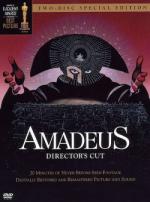Amadeus
 Year:
Year: 1984
Film Studio: Warner Bros. Pictures, The Saul Zaentz Company
Genre: Drama, Classic, Music
Length: 180 Min.
DirectorMilos Forman (1932)
WritingPeter Shaffer (1926)...Play
Peter Shaffer (1926)...Screenplay
ProducerMichael Hausman
Bertil Ohlsson
Saul Zaentz (1921)
CinematographerMiroslav Ondrícek (1934)
MusicWolfgang Amadeus Mozart (1756)...Composer
Neville Marriner (1924)...Conductor
Antonio Salieri (1750)...Composer
StarsF. Murray Abraham (1939) as Antonio Salieri
Tom Hulce (1953) as Wolfgang Amadeus Mozart
Elizabeth Berridge (1962) as Constanze Mozart
Roy Dotrice (1923) as Leopold Mozart
Simon Callow (1949) as Emanuel Schikaneder
Christine Ebersole (1953) as Katerina Cavalieri
Jeffrey Jones (1946) as Emperor Joseph II
Charles Kay (1930) as Count Orsini-Rosenberg
Review Most Broadway plays that are adapted for the silver screen tend to not have the same passion or relevance as their stage counterpart, in the case of Amadeus the opposite is true. By allowing the classical compositions of Wolfgang Amadeus Mozart to act as an unseen major character in the screenplay, an atmosphere of aural intensity and fluidity is created that help the viewer to become engulfed in the story of this flawed genius of the musical arts. Though highly fictionalized, the screenplay written by Peter Shafer and directed by Milos Forman delves into the rivalry between Mozart and the court composer of Emperor Joseph II of Austria, Antonio Salieri. It is the jealousy and intrigue of this one character that unfolds the story in a series of flashbacks told to a priest in a sanitarium in Vienna in the early part of the 19th century. Salieri, who is now an elderly man, has attempted suicide by slashing his throat. In his delirium he pronounces himself the assassin who brought about the death of the now famous composer. He recounts for the priest how he first came to know Mozart and how he plotted and schemed to bring about his demise. Through it all we are serenaded with music so beautiful that at the end of the film, we can understand why Salieri felt as if he was
“hearing the voice of God” in Mozart’s music.
F. Murray Abraham is the actor who brings to life the wily and envious character of Antonio Salieri. Largely unknown to film audiences at the time, his background on the New York stage was well suited to the adapted version of this successful play. His portrayal of essentially two characters in the film (young and old Salieri) would help to bring him the Best Actor Oscar for that year. On the other side of the coin, Thomas Hulce, who also was nominated for Best Actor, is simply sublime as the precocious, spoiled prodigy with the grating and garish giggle. This was the only time that I felt that co-winners should have been announced for an Oscar at the Academy Awards. As Salieri states in the film,
“Displace one note and there would be diminishment, displace one phrase, and the structure would fall”, take away one of these performances and the film would lose all resonance.
And finally, another player in the performance should have been rewarded with an Oscar in the category of Best Supporting Actor. Jeffrey Jones turn as the aristocratic, yet aloof
‘musical King’ Joseph II, is a scene stealing delight. Not only did he look and act the part of royalty, but also his delivery of the line
“Well… there it is”, which he uses repeatedly to convey an array of emotions, is priceless.
Ratings Criterion
- The pinnacle of film perfection and excellence.

- Not quite an immortal film, yet a masterpiece in its own right.

- Historically important film, considered a classic.

- An entertaining film that’s fun or engaging to watch.

– A good film that’s worth a Netflix venture.

- Borderline viewable.

– A bad film that may have a moment of interest.

– Insipid, trite and sophomoric, and that's its good points.

– A film so vacuous, it will suck 2 hours from the remainder of your life.

- A gangrenous and festering pustule in the chronicles of celluloid.